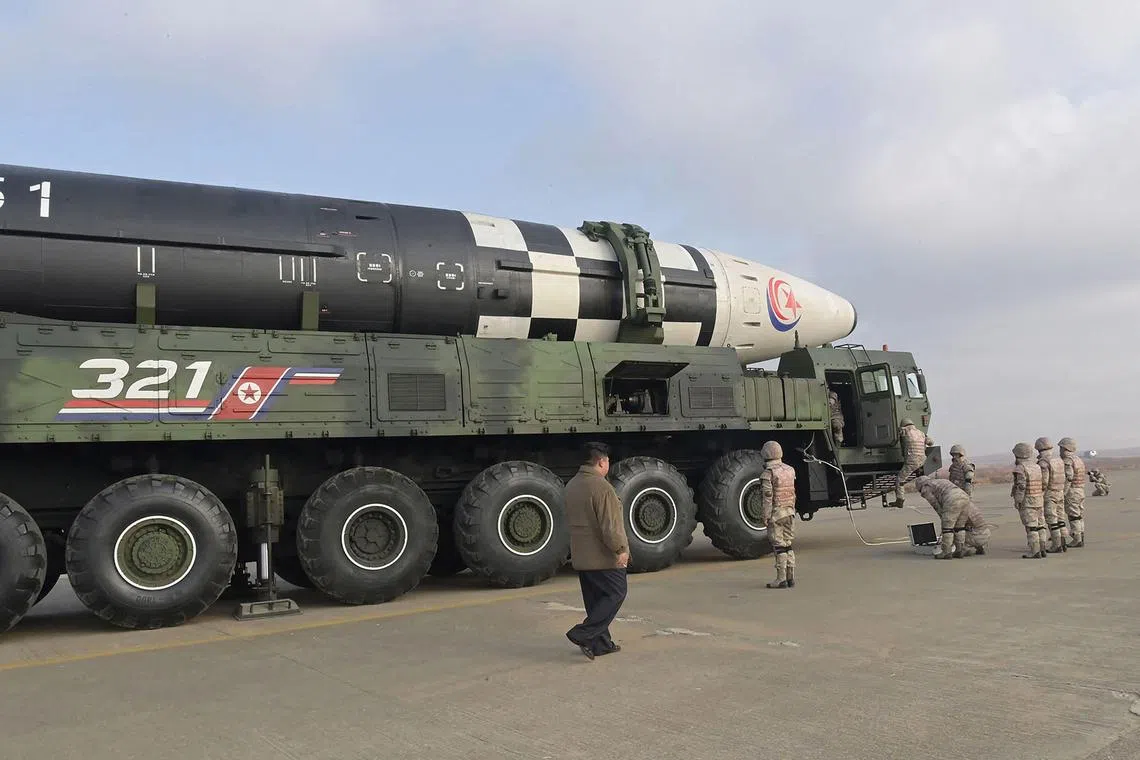US answers Kim’s missile barrage with stay-the-course policy vow on North Korea
Sign up now: Get insights on Asia's fast-moving developments

North Korea, which has declared itself a nuclear-weapon state, has fired off a record number of missiles this year.
PHOTO: AFP
Follow topic:
WASHINGTON – The Biden administration is not about to change its longstanding North Korea policy and will continue to focus on deterrence and stronger ties with Asian allies, a senior White House official said, despite leader Kim Jong Un’s unprecedented barrage of missile tests in recent months.
The United States is “always examining our assumptions” about North Korea but believes “the course that we’ve been on has been effective and prudent”, White House Indo-Pacific coordinator Kurt Campbell told reporters on Tuesday.
“It’s undeniable that North Korea is one of the most challenging issues on the global stage,” he said on the sidelines of the Trans-Pacific Dialogue conference in Virginia hosted by South Korea’s Chey Institute for Advanced Studies.
“Our best approach is to ensure that we are, in fact, in lockstep with our allies and partners, and we’re going to continue with that.”
In a confirmation of its commitment, the State Department said on Tuesday that it had approved the sale of 18 Boeing CH-47F Chinook helicopters, along with engines, radios and other parts, for South Korea, in a deal valued at US$1.5 billion (S$2 billion).
The State Department said the deal will “improve the security of a major ally that is a force for political stability and economic progress in the Asia-Pacific region”.
North Korea, which has declared itself a nuclear-weapon state, has fired off a record number of missiles this year
In November, North Korea test-fired a suspected intercontinental ballistic missile with an estimated range far enough to carry a warhead to the American mainland.
Test volume
The sheer volume of missile tests – and the looming possibility of a seventh nuclear test – has prompted some observers to call for a change to longstanding US policy, which has focused on sanctions and building ties with allies.
While some experts have called for tightening sanctions, or pressuring China, others argue for a more wholesale change to US foreign policy on North Korea.
Nuclear weapons expert Jeffrey Lewis wrote an opinion piece in the New York Times in October calling on Washington to “contemplate the unthinkable” and accept North Korea as a nuclear-weapon state.
Last week, the Biden administration said it was considering “all available tools” to punish North Korea and unveiled new sanctions – alongside Japan and South Korea – to pressure Pyongyang
Yet North Korea has been “incredibly sophisticated at avoiding sanctions” imposed by the US and allies, said Mr Joel Wit, a former senior State Department official who negotiated with North Korea in the 1990s and is now a distinguished fellow at the Stimson Centre, a non-partisan think-tank.
He said North Korea sanctions have largely been ineffective, in part because of the economic support Pyongyang receives from China, but that the US – mindful of not derailing its relationship with Beijing – does not have the appetite to alter its China policy.
“If you look at the history of this issue, the US periodically issues these sanctions, and they have no effect – the North Koreans don’t care,” Mr Wit said.
“Really ramping up sanctions means going at China – hard – because a lot of what happens economically in North Korea is related to China. So are we going to do that now, with China, just to get at North Korea? I don’t think so.”
Nuclear test
Speaking on Tuesday, Mr Campbell said the US does not know when North Korea might test another nuclear weapon but said Washington has warned of the consequences of doing so.
“We’ve sent a very strong signal to North Korea, to China, to Russia, to others, that a seventh nuclear test would be destabilising and extremely unhelpful during this delicate period,” he said. “We’re doing everything we can at this juncture, and we frankly just don’t know very much about the decision-making of Kim Jong Un and his team.”
Mr Campbell declined to answer questions about whether Washington would change aspects of its longstanding security umbrella in North-east Asia by deploying nuclear weapons in South Korea, but said the US is working to deter the use of such weapons in Asia.
“We are determined to maintain our nuclear umbrella under Japan and South Korea, even with the challenges that we’re facing,” he said. “And we are in deep consultation with allies and partners on what’s necessary in terms of making sure that our deterrent steps are critical and clear.” Bloomberg

